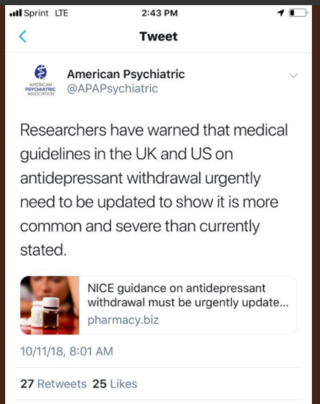SSRIs
Antidepressant Withdrawal and Patient Safety
A new survey provides vital details and requires urgent action.
Posted October 15, 2018

“This has destroyed my life as I knew it and made me incapable of functioning normally or healthily.” “I have lost my capacity to function on a daily basis and exist as a shadow of the person I once was.” “Pure hell. Thought I was going mad.” “Unmitigated hell. The pills have completely ruined my life.”
These and many similar remarks form a backdrop to Antidepressant Withdrawal, a comprehensive survey of patients’ experiences released last month by the UK’s All-Party Parliamentary Group for Prescribed Drug Dependence. The outcome of a year-long study involving almost 1,700 respondents, 319 of them users of antidepressant medication, the survey—undertaken with researchers at London-based University of Roehampton—represents one of the largest international surveys of its kind into withdrawal from psychiatric drugs, in this case antidepressants, antipsychotics, and benzodiazepines.
The qualitative data was gathered by report authors Dr. James Davies, Dr. Regina Pauli, and Luke Montagu. More than 90 percent of respondents “attributed the symptoms to being caused by withdrawal.” Their answers—summing up the often-incapacitating effect of withdrawal on their health, work, finances, and relationships—describe an intensity to their depression and anxiety altogether different from that for which the medication was initially prescribed. “On a scale of severity from 0-10 (10 being the most severe withdrawal),” the researchers note, “the mean average was 9 points.”
The report gives us data not often recorded in clinical studies. We learn that “around half of the survey participants were told that their original symptoms were caused by a chemical imbalance, a genetic problem, or something wrong with the brain.” The authors extrapolate, “It appears that doctors are continuing to promote the belief that mental health problems are biological diseases, despite the lack of evidence in support of this position.” They cite Joanna Moncrieff’s research-driven study, The Myth of the Chemical Cure: A Critique of Psychiatric Drug Treatment (2007). Additional references would include Irving Hirsch’s The Emperor's New Drugs: Exploding the Antidepressant Myth (2010) and Robert Whitaker’s Anatomy of an Epidemic: Magic Bullets, Psychiatric Drugs, and the Astonishing Rise of Mental Illness in America (2010), both also driven by meta-analyses and other published datasets.
Given the persistence of the belief among prescribers that depression and anxiety stem from a “chemical imbalance,” the report points to a gap between patient experience and physician interpretation. Many prescribers are quoted as insisting that their patients' adverse effects are always, necessarily, a return of the original symptoms. Many reject out of hand any correlation between heightened, acute sensitivity to noise, intense mood swings, and sometimes painful head zaps and adjustment in pharmacological treatment, despite the amount of time needed for the drugs to wash out of the brain and central nervous system. In the words of one respondent, “They dismissed any notion of withdrawal and prescribed a number of different medications.” Another writes, “The psychiatrists simply waived my story out of hand as impossible, saying that ‘it was just the old illness coming back,’ even though I’ve never experienced anything even remotely approaching this.”
“I used to get this burning sensation deep within my brain, especially towards the end of the day. Even my thoughts started to hurt me,” explains Alyne Duthie from Braemar, Aberdeenshire. Her chronic discontinuation problems were detailed in Scotland's Sunday Herald yesterday, in an article on the numbers countrywide “hooked on antidepressants—and harmed by withdrawal.” “Within days of coming off them,” Duthie continues, “I started having severe tinnitus, the kind that pierces your brain. I started having severe abnormal movements—my head, arms, and legs jerked constantly…. I would get boiling hot then freezing cold the next. I used to go around with cold packs strapped to my chest.” According to the newspaper, “a record 902,168 people in Scotland were prescribed antidepressants last year.”
In sharp contrast to this consistent summary of antidepressant withdrawal, well-sourced, empirically guided information on how to discontinue safely appears to be at a premium. That's a mounting problem given the millions of people prescribed psychiatric drugs worldwide. According to Antidepressant Withdrawal, a majority of prescribers “provided no advice regarding withdrawal.” Some 64 percent of respondents claimed “not to have received any information from their doctors on the potential risks/side effects of antidepressants they were prescribed.” And 25 percent were given “no advice at all about how to withdraw,” while 7 percent were told to withdraw “cold turkey.”
Just as critical, the symptoms of antidepressant withdrawal described often exceed and outlast current prescribing guidelines, which characterize discontinuation as generally “mild” and “self-limiting” (resolved in one to two weeks). Overall, 47 percent of all respondents experienced withdrawal and related adverse effects for more than a year. “The withdrawals are so severe,” one remarked, “that I cannot function to do simple tasks like make a cup of tea, let alone leave the house to go to work.”
In the section assessing the effect of withdrawal on relationships, comments included: “No sex drive (affects marriage).” “Find myself getting angry with partner and kids.” “My withdrawal symptoms include ... aggressive behaviour towards family.” “It has affected my relationship with my partner and children.” And, “withdrawal was the hardest thing I have ever done. It nearly destroyed me and my family.”
Given the alarming discrepancy between patient experience and doctors’ frequent dismissal of claims that the cause could be pharmacological, the researchers pull no punches in citing a widespread “failure of those responsible for their [patients'] care to understand and to treat the problem.” “Doctors and psychiatrists do not understand the potential harms of antidepressant withdrawal sufficiently,” they warn, “and a majority are not informing patients about side effects.” As such, the datasets informing the survey not only “make clear the ruinous impact of antidepressant withdrawal on some individuals;” they also expose “a deep deficit in the current understanding of the potential harms of antidepressants by doctors and psychiatrists.”
That deficit is a concern for multiple reasons, not least for patient safety. On the one hand, first-line prescribers of psychiatric drugs in the UK (76.4 percent of them GPs, the remaining 23.6 percent psychiatrists) are, in the words of several respondents, “in such complete denial of the harm they have been doing” that they simply cannot see the problem before them. “I was told that ‘discontinuation syndrome’ could only have lasted a few weeks,” one respondent writes, characterizing the objection, “so I didn’t know what I was talking about.”
However, according to “A systematic review into the incidence, severity and duration of antidepressant withdrawal effects,” the recently published meta-analysis by John Read and James Davies that is receiving international attention—alongside cognate analyses on the sometimes incapacitating experience of withdrawal from antidepressants—prescribers and physicians in the UK, the US, and beyond are relying on prescribing guidelines greatly at variance with empirically driven research. According to the meta-analysis, more than half (56 percent) of people who attempt to come off antidepressants experience withdrawal effects, and, of those, almost half (46 percent) experience withdrawal effects they describe as severe.

On Thursday last week, the American Psychiatric Association appeared to acknowledge the gravity and scale of the problem, tweeting from its official account at 8:01 AM: “Researchers have warned that medical guidelines in the UK and US on antidepressant withdrawal urgently need to be updated to show it is more common and severe than currently stated.”
The candor and sense of urgency were noted and broadly appreciated, though neither lasted into the afternoon. Within hours, the tweet had been taken down without comment or replacement, leaving the highly consequential matter of the APA’s position on antidepressant withdrawal altogether unclear. Was the organization now recanting that it considered withdrawal “more common and severe than currently stated”? Did it no longer think medical guidelines “urgently” needed updating?
Meanwhile, as patients and psychiatrists wait for clarification—including, in Britain, for the Royal College of Psychiatrists to update its own guidelines—we face the likelihood of ongoing, large-scale prescribing on the basis of empirically faulty data. With prescribing rates continuing to climb, millions of patients are not being given adequate or accurate information about the drugs' adverse effects, much less how to end treatment safely.
The scale of the drugs' discontinuation issues requires the following caution: patients concerned about adverse effects are strongly advised NOT to terminate treatment abruptly, but instead to taper (titrate) carefully and gradually by microdoses over a course of several months, always in consultation with their doctor, to ensure their own safety. Peer-reviewed, specialist information on discontinuation issues appears on the website Surviving Antidepressants, with a forum specifically on “Tapering.” Much of the early bibliography on withdrawal is also detailed here, in this 2011 post on “Side Effects.”
References
Davies, J., R. Pauli, and L. Montagu (2018). Antidepressant Withdrawal: A Survey of Patients’ Experience. Report from the All-Party Parliamentary Group for Prescribed Drug Dependence, UK.
Davies, J. and J. Read (2018), "A systematic review into the incidence, severity and duration of antidepressant withdrawal effects: Are guidelines evidence-based?" J. Addictive Behaviors: https://doi.org/10.1016/j.addbeh.2018.08.027
Read, J., A. Gee, J. Diggle, and H. Butler (2018), “Staying on, and coming off, antidepressants: The experiences of 752 UK adults.” J. Addictive Behaviors 25;88:82-85. doi: 10.1016/j.addbeh.2018.08.021




